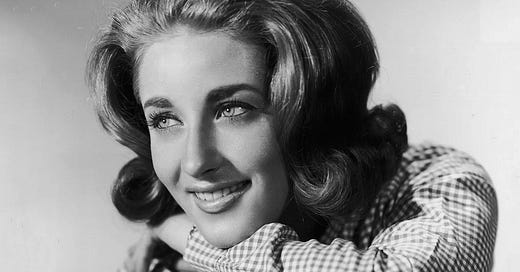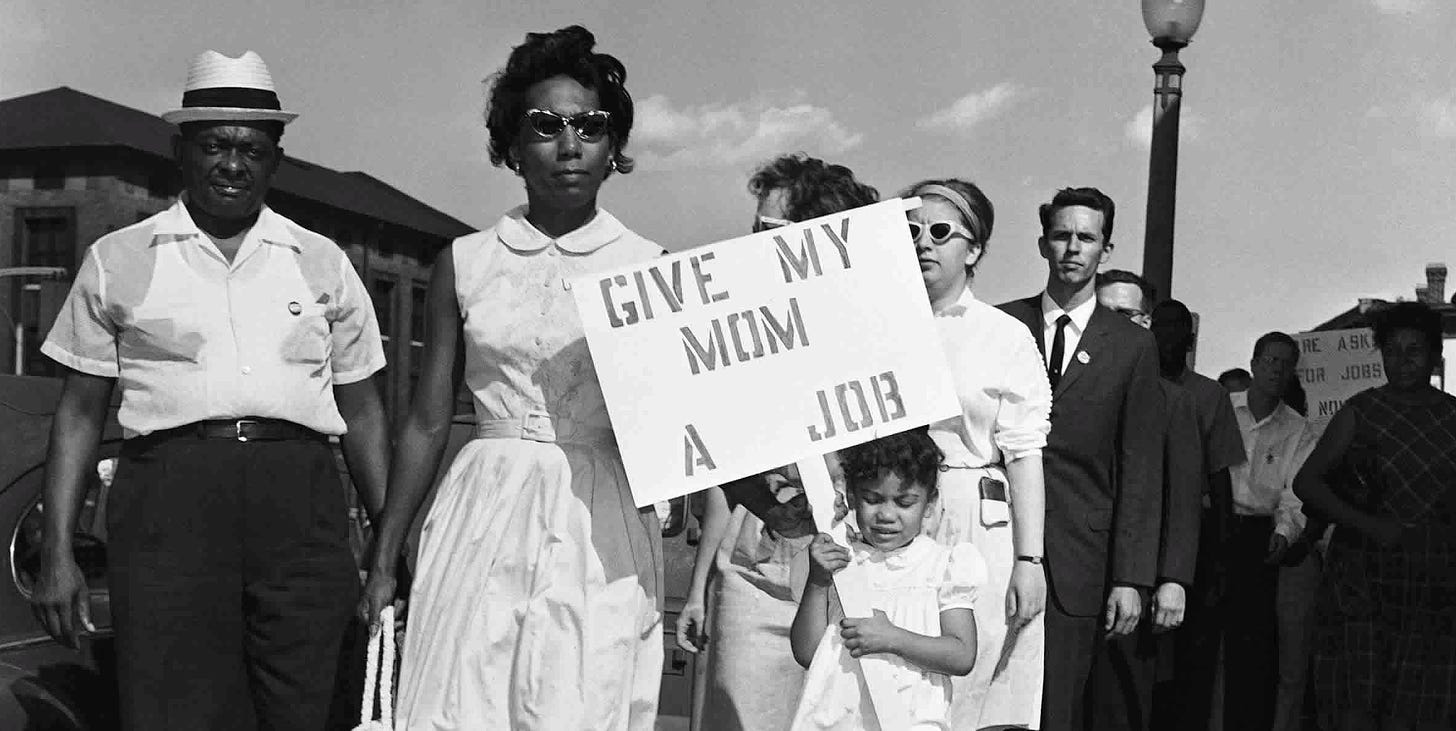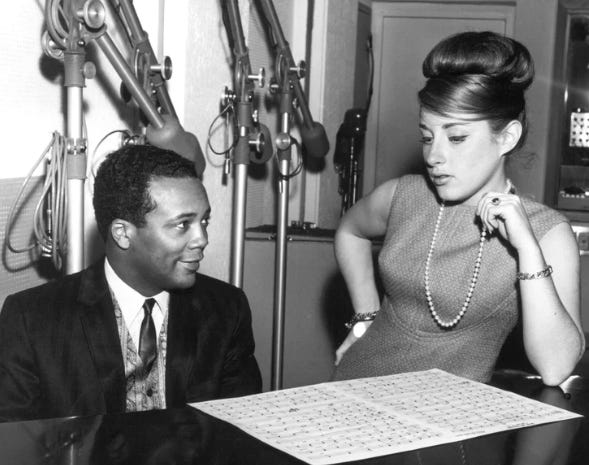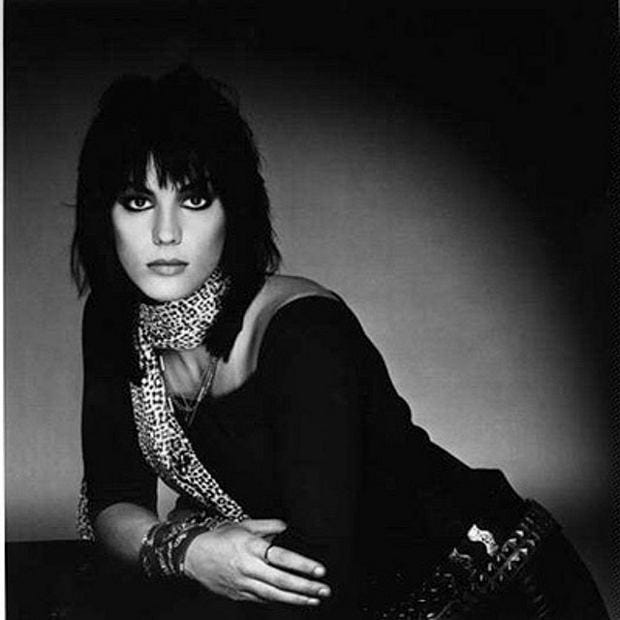How Lesley Gore went from boy-crazy teenager to queer feminist hero.
In last week’s issue on Joan Jett, we talked about how Jett covered Lesley Gore’s “You Don’t Own Me” as a way of telling her own queer story. Today, we’ll dive into the song’s origins.
If you happen to be scrolling through Indeed or Linkedin (and who isn’t in this economy?), you might notice a little disclaimer at the bottom of each job description that says some variation of “Employer XYZ does not discriminate on the basis of race, color, religion, sex and national origin.” This sentence isn’t some selling point about the company’s values — it describes legal protection for employees thanks to the Civil Rights Act of 1964. Originally, “sex” was left out of the legislation because who cares if women got fired. Their place was in the home after all. Luckily, women’s rights activists disagreed.
As if predicting a new era for women in America, a song about equality was released by a teen idol just a few months before the Civil Rights Act passed into law.
And don't tell me what to do
Don't tell me what to say
And please, when I go out with you
Don't put me on display 'cause
You don't own me
Lesley Gore didn’t set out to become a feminist hero. In fact, some of her earlier songs are gag-inducing odes to being a doormat. Check the lyrics to “That’s the Way Boys Are” — which was (surprise!) written by a man.
When he treats me rough and he acts as though he doesn't really care
Well, I never tell him that he is so unfair
Plus, he loves me and I know it
But he's just afraid to show it
'Cause that's the way boys are
When Gore at age 16 became a pop sensation, her brand was more June Cleaver than Gloria Steinem.
She was discovered by former jazz sensation turned Vice President of Mercury Records, Quincy Jones. Gore’s vocal coach happened to be friends with Jones. Both agreed the young singer had star power. In a recent interview with Jones, he admitted that, of all of the successful artists he’d ever produced, only two had perfect pitch. One was Lesley Gore. The other was Frank Sinatra.
To find her first hit single, Jones and Gore pored over hundreds of songs together in her family’s Brooklyn home until they agreed on a ditty called “It’s My Party.” Neither loved the song, but they needed to act quickly because rumor had it that Phil Spector also wanted the song for one of his girl groups. The choice proved a good one as “It’s My Party” shot to no. 1 on the charts.
Both “It’s My Party” and its immediate follow-up, “Judy’s Turn to Cry,” captures the experience of a scorned teen girl whose boyfriend cheats on her at HER OWN PARTY with one of her friends. She then enacts revenge on Judy (as if she’s the only one to blame) by wooing her boyfriend, Johnny, back into her arms. Johnny, a scumbag who skirts all blame for his actions, hooks up with both girls without consequence because, as Gore’s song suggests, “that’s the way boys are.”
The lyrics of these songs are patriarchal droll that pit women against each other for the attention of a man. And they were normal for the times. Almost every song written for women in this era painted them as subservient objects for men to consume and discard. Take, for example, the abusive 1962 hit “He Hit Me (It Felt Like a Kiss)” by the Crystals.
He hit me and it felt like a kiss
He hit me and I knew he loved me
If he didn't care for me
I could have never made him mad
But he hit me and I was glad
So how did Lesley Gore go from desperate, boy-crazy teen to feminist icon?
Songwriters John Madara and David White, who had gained early rock n roll success with hits like “At the Hop” and “Rock n Roll is Here to Stay” had been inspired by the 1963 hit, “Don’t Make Me Over,” sung by Dionne Warwick. It was the first song to hint that women aspire to more than servitude.
Now that you've got me at your command
Accept me for what I am
Accept me for the things that I do
Inspired by the revolutionary concept that women could be seen as equal partners in a relationship, Madara and White set out to write their own variation and presented the results to Gore, the current star perched atop the Billboard charts. Gore loved the idea.
“You Don’t Own Me” proves that being anti-patriarchal isn’t about hating men. It’s about hating a system rooted in oppression. The men who wrote the song wanted to change the conversation. Madara and White also admitted that “You Don’t Own Me” was a response to the brutality that Black Americans were facing at the height of the Civil Rights Movement. “It was horrible, horrible, horrible,” Madara told Time magazine. “My friends and I got locked up in Philadelphia and Mississippi, and they treated us like gangsters. And my Black friends got hit more than I got hit. [The police] had billy clubs and hit you across the legs, but the Black guys got hit across the body. Those are things you don’t forget.”
“You Don’t Own Me” marked a seminal moment for women fighting for equal rights in 1964. It also changed Lesley Gore’s personal trajectory. The lyrics had soaked in and Gore, then 17, was ready to explore more serious parts of herself. Against the wishes of her record company, Gore risked losing the momentum of fame to pursue a college degree. She became an activist, volunteering for Robert Kennedy’s presidential campaign in 1968. She also began having relationships exclusively with women.
“I just kind of lived my life naturally and did what I wanted to do,” she told the entertainment site After Ellen when she came out in 2005. “I didn’t avoid anything, I didn’t put it in anybody’s face. Times were very different then, so, you know, I just tried to live as normally as humanly possible. But as truthfully as humanly possible.”
Though Gore would continue to make music and try on acting (She did a guest stint on the Batman television series as “Pussycat,” one of Catwoman’s evil minions.), she would often come back to activism. Gore publicly came out as a lesbian while hosting the PBS program In the Life, which featured stories about gay youth growing up in small towns. “I did that really as a result of meeting a lot of young gay people in the Midwest who really had nothing to relate to. At least I felt this program is presenting them with some options. I saw what a difference a show like In the Life can make to their lives in some of these small towns where, you know, there are probably two gay people in the whole damn town,” she added in an interview with After Ellen. “It’s made real inroads for them. They come and talk to me about this stuff, so I know how important it is.”
“You Don’t Own Me” became a rite of passage for several queer women in rock n roll. The year it was released, fellow teen queen Dusty Springfield (and one of Gore’s besties) covered the tune. In 1980, girl punk pioneer Joan Jett covered it on her debut album. Jett and Gore would also work together in 2013 as activists for reproductive rights by recording online PSA videos encouraging women to vote in the presidential midterm election. Gore ended the video with the message “I recorded ‘You Don’t Own Me’ in 1964. It’s hard for me to believe, but we’re still fighting for the same things we were then. Yes ladies, we’ve got to come together. Get out there and vote and protect our bodies. They’re ours.”
I don't tell you what to say
I don't tell you what to do
So just let me be myself
That's all I ask of you
Like this post? If you felt inspired or learned something, consider supporting my work by upgrading to a paid subscription.
Did you catch last week’s issue?









Love this song and absolutely ADORE the video, one of my faves!!